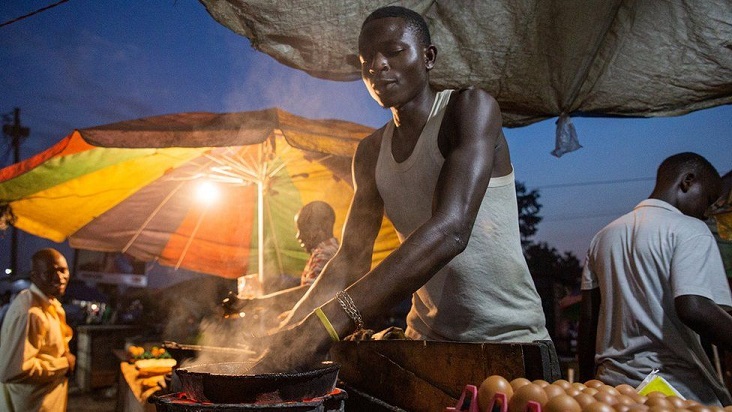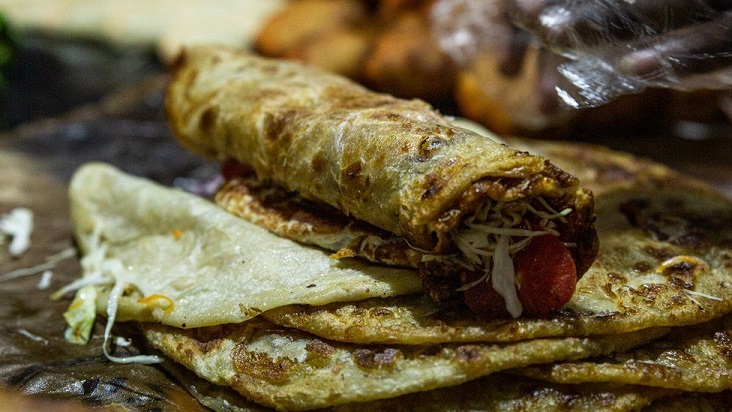This roadside rolex is a lot smaller than the world record breaker/MIRIAM WATSEMBA/BBC
The world’s largest rolex weighs 204.6kg (32st 3lb) and is 2.32m (10ft 6in) long.
If you’re struggling to imagine how that could fit on your wrist then forget the Swiss watch brand and think East African street food.
As Ugandans have been known to say: “We don’t wear Rolex, we eat them.” Rolex – the snack – is a shortening of “rolled eggs”.
The popular dish, found at road-side stalls throughout the country, is made from a vegetable omelette with added tomatoes wrapped up in a chapati.
It has already achieved some notoriety beyond Uganda but recently Guinness World Records certified the world’s largest rolex.
The ingredients that went into the hefty dish included 1,200 eggs, 90kg of vegetables (onions, tomatoes, cabbages, carrots and peppers), 72kg of flour and 40kg of cooking oil.
As you can imagine, this wasn’t the sort of thing that could be whisked up at the side of the road. In fact, it took a team of 60 people to get it ready.
Ugandan YouTuber Raymond Kahuma mobilised the chefs and bakers who spent 14 hours mixing, kneading, chopping and frying the ingredients in a temporary outdoor kitchen in the east of the capital, Kampala.
The challenge involved physics as well as cooking skills. Moving the dough to the frying plate without it breaking apart proved tricky, as well as getting it onto a weighing machine.
“Raymond and his team had been working for months on the preparation of the record to make sure everything went smoothly on the day,” Guinness World Records said.
A similar attempt at the record in 2020 flopped after gobbling up $3,000 (£2,200) in costs, according to Kahuma.
But giving up “seemed like me giving up on myself again”, the 24-year-old, who had dropped out of an electrical engineering degree, said on his YouTube channel.
It is believed that the rolex delicacy was first popularised by a food vendor who sold it to hungry students from Kampala’s famous Makerere University. The dish then spread to other towns.
The snack is now regarded by Ugandans as a favourite fast food in a country where parking spaces and roadsides are routinely turned into food stalls in the evenings.
The sight of people crowded around charcoal stoves perched on wooden stools, chatting as they wait for their rolex orders to be prepared is ubiquitous.

Aaron Odeke got into the rolex business a decade ago at just 12 years old after failing to find another job.
His stall is among rows of rolex vendors outside the Islamic University in Uganda in the eastern town of Mbale. He sells about 100 rolexes a day at 2,000 Ugandan shillings ($0.57) each, mostly to students.
He swiftly works with the onions, tomatoes, green peppers and carrots, and sometimes adds pieces of cooked meat if the customer wants something extra.
The whole process of cooking a rolex is fast – less than three minutes when all the ingredients are ready.
Across the road, Sunday Bidomba, 28, says that there are two main ways of preparing the rolex: pizza style, which involves cutting the chapati into pieces and mixing it with the eggs and vegetables and cooking over low heat, and the traditional style of rolling an omelette over the chapati.
One of his happy diners, law student Nsubuga Male, says the cheap fried delight gives him the same satisfaction as a full meal in a restaurant.
But the street food has made the jump to posher venues and it now has a place on the menus of upscale restaurants where it costs more – about four times more in some cases – than the street price.
Nevertheless, foodies say the taste of the hotel rolex does not come close to the taste of the street version.
That X-factor could be the individual skill of the vendor, each with a version of their own as they fry one order at a time. Or it could be the roadside ambience that attracts all-comers.
It is common to see people in smart suits standing side-by-side with the less prosperous as each waits for their order.
Now, Guinness World Records’ recognition of the world’s biggest rolex means the time has come for the world to embrace this Ugandan treat.
-BBC





